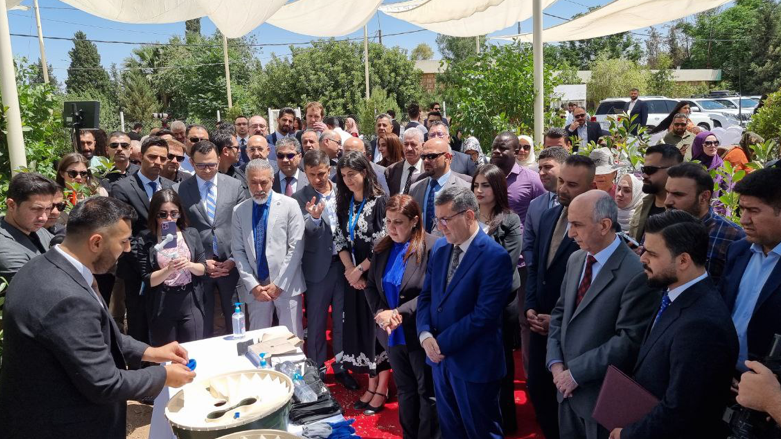5,000 trees planted in Erbil with support of Dutch planting technology

ERBIL (Kurdistan 24) – The Rwanga Foundation in cooperation with the World Food Programme (WFP), and funded by the German Agency for International Cooperation (GIZ) on Monday planted 5,000 trees with a new Dutch planting technology called Groasis Waterboxx.
The event was held at the Salahaddin University - College of Agriculture (Grdarasha) in Erbil. The Rwanga Foundation said the project “is part of our ongoing efforts to promote sustainable and environmentally friendly urban centres and to promote food security in Erbil City.”
Rwanga's communications officer, Narin Salam, told Kurdistan 24 that the event was part of a three phase project, of which the first stage was already concluded.
Read More: Over 100 million trees set to be planted in Erbil by 2030
“Today represented the second stage of the project, which included planting 5,000 trees and coordinating with the Salahuddin University, the College of Agriculture.”
“This project is using new technology called Groasis Waterboxx. This is the first of its kind to be used in Iraq. The device only needs 15 liters of water per month to operate. So, you put it inside the box and you leave it until the next one. So it saves water and keeps it from evaporating.”
Within the next months, Rwanga also plans the next stage of planting another 30,000 trees with the same technology.
“We are now collaborating with Salahaddin University and WFP, with funding from GIZ.”

Atheer Ghanim, the Iraq office manager of Regreening B.V., who imported the water boxes, says they started a few projects to export Dutch technologies abroad related to water efficiency and to combat climate change.
For this reason, they have given workshops at the university and for Rwanga, and they are planning to do projects not only in the Kurdistan Region, but also other parts of Iraq.
He underlined that the inventor, Pieter Hoff, of the Groasis Waterboxxe was designed to be recyclable, aiming to restore the climate while minimizing the impact on nature by reducing plastic waste, he said.
“These water boxes have a lifespan of 8, 10, or 12 years and can be utilized until they reach the end of their usable life.”
WFP’s Iraq Deputy Country Director, Ekram Huni told Kurdistan 24 that these kinds of projects are at the heart of World Food Program projects in Iraq “because we envision that there are strong interlinkages between climate change and the climate crisis and food security.”
“And so as long as we can tackle climate change and work with different counterparts and climate adaptation and mitigation projects, such as with initiatives such as these, then we can also ensure that we can enhance food security for the people of Iraq and and improve their resilience and livelihoods as well as building for a greener and healthier ecosystem for all.”
Since Iraq is the fifth most affected country of climate change in the world, the WFP is concerned about the broad implications and consequences. Therefore, “we work closely with the government agencies, other related stakeholders, international actors and the private sector in tackling this issue.”
